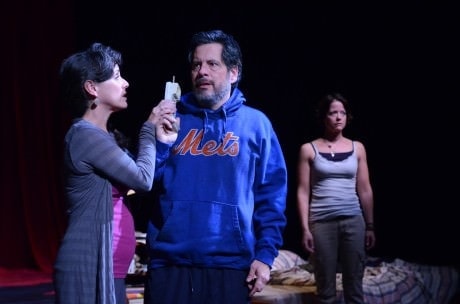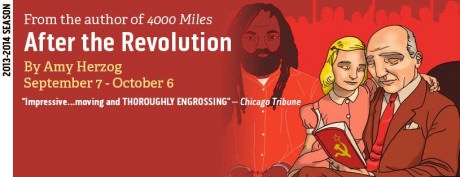Who would have guessed that a family drama about everyday ethics and far-left ideology could be so engrossing and engaging, the characters so real and riveting, that what happens on stage enters one’s mind as if the fourth wall has fallen?—as if the the play has liberated a new theater zone?—as if the tension between character and conscience seems more alive than in real life?

After you see After the Revolution at Theater J—as any thoughtful theatergoer with a moral compass and a pulse must—you’ll know what I’m talking about. This brilliant play by Amy Herzog, in a brilliant production directed by Eleanor Holdridge, invites us into a shared experience that is in its own way…revolutionary.
It’s the turn of the century, 1999, and three generations of the Joseph family, whose history is steeped in Communist politics, are about to come to terms with their ideals in the face of reality. Even before we meet each fascinating one of them, we are met by a set (eloquently designed by Misha Kachman) that says post-revolution “red” all over: A vast blood-red curtain hangs draped in the background. The stage surface is black with enigmatic, odd-shaped patches of red (countries deformed and split apart after the fall of the Soviet Union? blood on the floor spilled by Stalin now staining and straining Communist dogma?). Upon this ambiguous landscape are situated settings of hominess and human connection: A living room, a dining-room table, a bedroom, a table for two at a restaurant. The contradictions in this stage picture speak volumes before a single line is spoken.
Paterfamilias Joe Joseph, who notoriously refused to name names during Senator McCarthy’s inquisition, is deceased, and his devoted widow, Vera (Nancy Robinette), keeps the flame of their shared certainty burning. In her two baby-boomer sons, Leo Joseph (Jeff Allin) and Ben Joseph (Peter Birkenhead), however, the flame flickers with somewhat less conviction. Plus, they are privy to a shocking disclosure about their father that will soon rock their ideological world and put family ties to ethical tests that will captivate us for two of the fastest-moving acts any playwright can muster.
But this is not just “any” playwright.

When I saw Herzog’s 4000 Miles at The Studio Theatre last year—in which her wonderful character Vera also appears (a little deaf, a bit daft, but sharp as a tack)—I knew that Herzog belonged on my short list of favorite English-speaking playwrights. Besides her astounding command of form and substance, her knack for the quirks and rhythms of character-revealing dialog—which the entire cast played to perfection—has a remarkable effect: It instantly seems recognizable and true to life even if it’s something you’ve never heard of or thought of before. What you might think (from reading the very informative program notes) will be a heavy slog through radical politics and history (which you maybe can’t remember or maybe never knew) becomes in Herzog’s sure text one illuminating revelation after another—so easy to follow (because it’s always in-the-moment human) that all you get lost in is the performance.
Ben Joseph, who married Mel (Susan Rome), his second wife, has two gen-X daughters: Jess Joseph (Elizabeth Jernigan), who has been in and out of rehab with barely a political pilot light, and Emma Joseph, whose storyline of blazingly radical political advocacy emits heat and light throughout. Emma (Megan Anderson) is dedicated to raising money for the defense fund of Mumia Abu-Jamal, the real-life black revolutionary then on death row for killing a cop. She runs a foundation (named after her legendary grandfather Joe) where her feminist fellow-traveler boyfriend Miguel (Carlos Saldana) also works and for which she gets big bucks from an elder philanthropist, Morty (James Slaughter). Herzog’s use of Mumia Abu-Jamal, whose supporters confronted ideological and ethical ambiguities in his case, functions intriguingly in the play to mirror the ideological and ethical ambiguities now confronting Communism’s true believers.
The Joseph family’s interwoven stories unfold in poignant scenes, between which we hear beautiful guitar-and-cello interludes (composed by Matthew M. Nielson), punctuated by lyrical shifts of lighting (designed by Andrew Cissna). Meanwhile director Holdridge pulls our focus from scene to scene, character to character, with a kind of grace that is almost cinematic. The overall effect is almost enchanting, even as we feel the undercurrent of realpolitik and a family pitched into crises of conscience.

Herzog has said that she based the Joseph family in part on her own. The values she grew up in came from Marx. She was a red-diaper baby. Yet among the many extraordinary aspects of her dramatization of the Joseph family is that it speaks deep truths no matter one’s personal political beliefs and no matter one’s own family history. I would not go so far as to call it an Our Town, but it is certainly an Our Family of Conscience.
From some morally murky materials, and her human-all-too-human characters’ honest efforts to find their best way to the best future, Herzog, in the hands of a solid cast, has forged a play that is monumental.
Running Time: Two hours and ten minutes, and one intermission.
After the Revolution plays through October 6, 2013 at Theater J at The Washington DC Jewish Community Center’s Aaron & Cecile Goldman Theater – 1529 16th Street NW, in Washington, DC. For tickets, call Box Office Tickets at (800) 494-TIXS, or purchase them online.
LINKS
John Stoltenberg’s review of 4000 Miles
Playwright Amy Herzog talks about After the Revolution.





